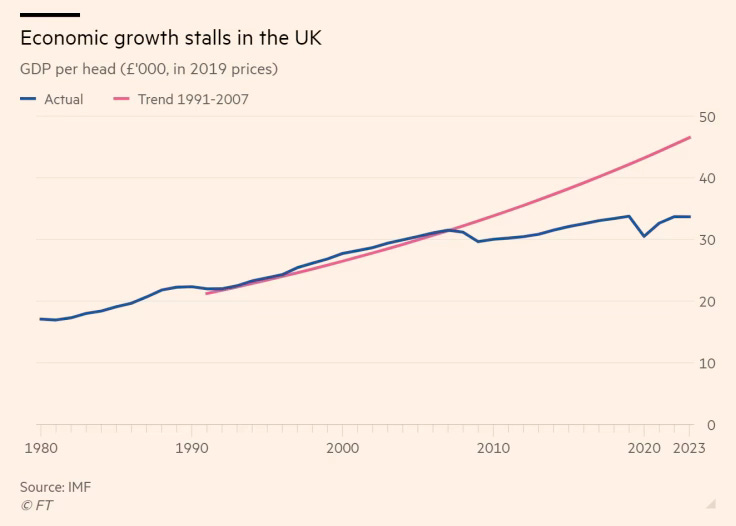I'm worried the Tories are too left-wing for me
It's not me, it's them.
I always thought it was a myth that you get more right-wing as you get older.
“That won’t happen to me,” I said to myself, “I have all the correct opinions now, so what possible reason is there for my views to change?”
So it was with grim inevitability that in my twenties, I began to see the value in politics that are little more squishy and centre-left than the hard-edged and radical views you tend to have when you’re younger.
Or to put it another way, I used to think that I was really quite left-wing, but then the whole Corbyn thing happened, and confirmed that I was perhaps not quite that left-wing after all.
Broadly speaking though, I’ve made peace with my more boring, milquetoast politics. The only weird thing about it is that I’m probably the only person in the world who goes to see right-on punk bands like Propagandhi and Bad Cop Bad Cop play live, and then listens to the Institute for Government podcast on the way home1.
Anyway, I’m not the only person who has been on a political journey. As it turns out, over the last 13 years many Conservative MPs have too. And I’m not talking about a drift further to the right.
In fact, I think in several key respects the Tories have gone the other way, and now I find myself in the unusual position of being way to the right of the Tories on a number of issues. So let’s go through them and find out why.
If you value my writing, don’t forget to subscribe for free to get more politics, policy and… whatever this is… direct to your inbox. And if you really like me, sign up as a premium subscriber and support me writing every single week!
1. Commissars in Whitehall allocating jobs
Something very strange has happened to what used to be the party of the free market. Thanks to the actions of successive Conservative Prime Ministers, we’ve ended up in a situation where it isn’t the businesses and the entrepreneurs – the job creators – deciding who gets to work. Instead we have an incredibly complicated Soviet-style bureaucracy making these decisions instead.
For example, imagine if I was a small business owner. For the sake of argument, let’s imagine it is a company the Tories would traditionally love: It sells both fox hunting finery and collateralised debt obligations.
Once I’ve registered the business in the Cayman Islands for tax efficiency reasons, and established a British subsidiary, if I want to hire the finest tailor-slash-structured-finance-associate in all of Europe, they would first have to navigate a complex web of paperwork. They would need to fill out visa applications, each with their own detailed small-print, and wait for the government to approve moving over. And then once they have started work, I’d have to pay them at least £38,000, according to the new Home Office rules.
It’s hard to think of a more anti-business policy. Why should it be the commissars in Whitehall that decide what jobs we want people to do and not the free market?
In any case, it’s obvious that the current Soviet system doesn’t work. It shouldn’t be the case that we should lurch from crisis to crisis in different sectors of the economy, with politicians making key hiring decisions once the situation becomes sufficiently dire.
In my view, it would be much more authentically Conservative to adopt a policy of market-led movement, where we trust our great businesses to hire the people they need. Supply and demand – not bureaucrats – would dictate who gets hired.
And perhaps we could conclude some sort of agreement with neighbouring market economies to reciprocate? We could even extend it to include other pro-business measures like facilitating the free movement of goods, services and capital – as well as people?
2. Central planning system
One of the reasons the Conservative Party has historically proven such an effective political actor is that it is governed not by pages of rules and procedures, but by a ruthless cabal known as the 1922 Committee, which oversees things like leadership elections.
It’s effective because despite appearances, if a rule becomes inconvenient, it can be very easily ripped up or ignored by the committee – enabling the party to act with much greater speed and efficiency.
This is no doubt particularly frustrating for Labour, which in classic lefty fashion is encumbered with an ungodly number of committees, regulations and protocols to make decisions. It means that the party is unable to move quickly, and instead everything from policy to election campaign strategy has to be torturously negotiated.
And I’m sad to say that despite having had thirteen years in power, the Conservative Party still oversee a country with planning laws that more closely resemble Labour’s sclerotic approach than that of a party that prizes a dynamic, laissez-faire economy.
In fact, the current planning rules are so poorly designed for building homes that it feels like everyone is following the instructions laid out by the deep-state on how to slow down meetings.
This is why I think a different approach is needed. We need a bonfire of the planning red tape, to make it easier for property developers to receive permission to build. We should limit the number of veto points, such as environmental reviews, so we can increase the number of homes. And if we can do that, more young people will be able to achieve the small-c conservative dream of home ownership.
If only the Conservative government could see this as clearly as I can!
3. Handing tax-payers money to other countries instead of helping people at home
I used to think I was pretty left-wing on foreign aid spending, as I'm a staunch supporter of the 0.7% foreign aid target. But amazingly, Rishi Sunak has managed to horrify even me with his foreign spending largesse.
I’m talking, of course, about the commitment to send £240m of UK taxpayers money to Rwanda. It seems crazy to me that we’re sending it abroad in exchange for virtually nothing in return, when we could be helping people here in Britain instead.
For example, instead of lining the pockets of the Kagame regime, we could be using it to get tough on the small boats problem, by employing more British workers to process asylum applications more quickly, and by supporting British police officers to tackle the criminal gangs that are facilitating such a dangerous trade.
We could even use the money to support asylum seekers here in Britain to help them find work and integrate into our communities – looking after people at home first, rather than sending the money to Kigali.
4. Radical disregard for institutions
Edmund Burke famously wrote that “good order is the foundation of all things”, and the Conservative Party has, almost by definition, historically been the party of Burke, prizing respect for our institutions above all else.
So it is strange that the party appears to have developed its own radical faction, hell-bent on smashing the state.
During the Brexit years, we of course had the attacks on the “Enemies of the People” in the courts, and Boris Johnson’s unprecedented prorogation of Parliament as part of the Parliamentary shenanigans over Brexit. Then there was the proposal to break international law in a “very specific and limited way” in order to conclude a bilateral agreement with the European Union.
But the rot goes beyond the actions of just one man, and appears to be endemic in the culture of the party. For example, more recently, the party’s radical vice-chair argued that the government should “ignore the law” in order to send people to Rwanda. Burke must be spinning in his grave.
In any case, this just seems bizarre to me. Here I am, boring social-democrat that I am, and I happen to think that the rule of law is actually a good and necessary thing. It seems bad to me that actual Tory Members of Parliament are undermining some of the core institutions that have evolved to protect us. And I’m the one with the traditional right-wing view that we shouldn’t recklessly tear institutions down.
5. Embracing degrowth ideology
And finally, there is perhaps the most significant ideological realignment in the Conservative Party. Since 2010, the party has torn up its traditional commitment to business and instead appears to have embraced the sort-of radical de-growth ideology that is more typically found on the neo-Malthusian left.

The party hasn’t quite managed to shrink the economy yet, but if you glance at the GDP figures, then it is difficult to draw any other conclusions than that it must be the goal they are ultimately pursuing. Why else would they have remained so wholeheartedly committed to such sluggish economic growth?
Assuming they’re trying to shrink the economy would also explain why they’ve been careful to make it as hard to build as possible, cut HS2 off at the knees, and keep the Postcode Address File trapped behind prohibitively expensive licensing fees.
Perhaps Rishi Sunak captured this de-growth vibe best when he said we “have to live within our means”. Because instead of imagining a future where a growing economy can help us prosper while decarbonising simultaneously, instead the Conservative Party has concluded that the only solution is to reduce our standard of living in pursuit of some imagined greater good – exactly like the most hardcore environmental activists.
Anyway, I’m not sure why they’ve decided to take such a strange ideological turn. But I guess it explains why Labour is now more trusted by voters to grow the economy.
Perhaps that’s why the Tories are doing so badly in the polls? Like Corbyn in 2019, if the above examples are anything to go by, then perhaps the modern Conservative Party is just too damn left-wing for the electorate?
And that’s my list… so far. What have I missed? Are you horrified by my shocking right wing opinions? Perhaps we could suggest some more ways the Tories have moved to the left in the comments?
And if you enjoyed reading this, please subscribe (for free) for more stuff like this. Maybe you’ll like this screed on “woke”? Or if you really value my work, you can take out a paid subscription so I can continue to write every single week!
The theme music is, as the kids say, a banger.




The elder Tories I've spoken to in the last few years feel exactly like this, though they express it with a lot less humour. They are flabbergasted (which I think is an appropriate adjective for an elder Tory) at the total abandonment of the principles (small government, free markets, law & order) that attracted them to the party in the first place.
Hard relate. Went to a gig in Hackney last month, one man electro sound world with vintage Super8 film visuals screened behind him... listened to Health On the Line podcast en route. Who doesn’t like a bit of health system reform with their alternative music?